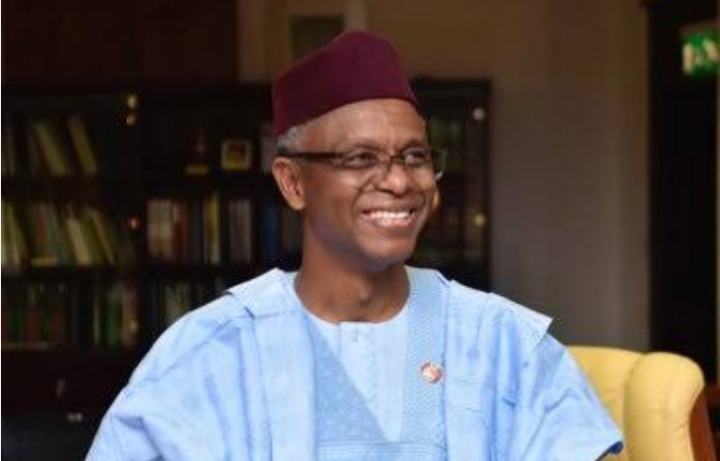Nasir Ahmad El-rufai Biography | Age | Education | Wife | Children | Net Worth

Mallam Nasir Ahmad El-Rufai (born 16 February 1960) is the incumbent Governor of Kaduna State and former Director General of The Bureau of Public Enterprises, the head privatisation agency in Nigeria and also the former Minister of the Federal Capital Territory, Abuja from 16 July 2003 to 29 May 2007. He is a member of All Progressives Congress (APC) and elected as the Executive Governor of Kaduna State during the 2015 general elections in Nigeria. His spell with the government began under the transition government of General Abdulsalami Abubakar, where he served as an adviser in the Transition government. He was reportedly in self-exile during the tenure of President Umaru Yar’Adua. In November 2009, Nasir EL-Rufai stated plans to come back home to Nigeria despite the high level of risk he will be under.
Education
EL-Rufai was born in Daudawa of Faskari Local Government Area in Katsina State. Despite his northern upbringing, Nasir El-Rufai has always said he is “Nigerian” first before being “Hausa”. His father who lived on a pension of three pounds a month died while the young Nasir was 8. He was sponsored throughout his schooling days by an uncle in Kaduna, and as a result grew up in the influential Northern state. He went to secondary school in the prestigious Barewa College, where he graduated at the top of the class, winning the coveted “Barewa Old Boys’ Association Academic Achievement” Trophy in 1976. Incidentally, in Barewa College Zaria, the former President Umaru Yar’Adua was the House Captain of Mallam Smith House which was Nasir’s dormitory as a junior. He went off to Ahmadu Bello University, Zaria, earning a Bachelor in Quantity Surveying degree with First Class Honors. He also attended post-graduate programs at Harvard Business School and Georgetown University. Since leaving public service, Nasir has completed an LL.B degree from the University of London, graduating in August 2008 with Second Class Honors, Upper Division, and a master’s degree in Public Administration from the John F. Kennedy School of Government, Harvard University in June 2009. He also received the Kennedy School Certificate in Public Policy and Management having spent 11 months as an Edward A. Mason Fellow in Public Policy and Management from July 2008 to June 2009.
Early career
Nasir established a Quantity Surveying and Project Management Consulting firm in 1982 with three other partners. The firm was quite successful, handling mainly building and civil engineering projects in Nigeria, and made the partners wealthy millionaires while still in their twenties. From November 1999 to July 2003, he was the Director General of the Bureau of Public Enterprises and the Secretary of the National Council of Privatization where he spearheaded the privatisation of many government owned companies alongside the controversial former Vice-President. El-Rufai is a known crusader against corruption, having previously successfully exposed two senators that demanded bribes from him to ease his ministerial confirmation. He presided over a real estate boom backed by the radical transformation of infrastructure and land use practices of the federal capital earlier riddled with corruption and vast deviation from the original masterplan. With the establishment of the Abuja Geographic Information System within 12 months of being Minister of the FCT, Abuja became the first municipality in Nigeria with a computerised land register and information system. Along with the President and members of the Economic Management Team, he led the reform of the Nigerian public service which had become dysfunctional during years of military dictatorship. At various times during his tenure as Minister, he oversaw the Federal Ministries of Commerce (twice) and Interior. He also chaired several high-profile cabinet committees that led to the establishment of a mortgage system in Nigeria, National ID card system for Nigeria, Electric Power Supply Improvement and the sale of Federal Government real estate in Abuja.
Political career
During the last days of the Obasanjo administration, the former EFCC Chairman described El-Rufai as the “de facto No. 2 official”, tagging him with the role of a Vice-President, especially after the fall-out between the former President and his Vice-President. It is believed that Obasanjo’s trust and confidence in El-Rufai angered a vast number of the political elite within the country. Indeed, it was widely believed that the former President was considering blessing EL-Rufai as his successor. However, it was believed the vast political powers against him were too much, probably as a result of the fear of what may happen to them once he was in power.
Many view El-Rufai as a corruptible public servant who can’t get difficult jobs done, especially after he ordered the demolition of the house of the Chairman of the ruling party in Nigeria. However, since the end of the Obasanjo administration, El-Rufai has kept a very low profile, but still remains an Obasanjo loyalist having frequently defended the former President’s policies.The administration of the President, Umaru Yar’adua appointed El-Rufai to the National Energy Council in September 2007, due to the belief that he could contribute positively to the under-achieving power sector of the country. Nasir resigned the appointment in June 2008, and on 30 April and 7 May 2008, El-Rufai appeared before the Nigerian’s Senate Committee on Federal Capital Territory to explain some exposed and corrupt actions of his administration. He attempted to justify his actions and stoutly rejected cynics views on the allegation that he allocated plots of land to his friends, brother and cronies, and it was clear that many of the Senators had lost properties during the restoration of Abuja by El-Rufai and were therefore just out to get their pound of flesh. To a vast amount of Nigerians, El-Rufai is simply being witched-hunted for stepping on the toes of the corrupt political elite within the country. This is largely because, unlike a number of aides to the former President Olusegun Obasanjo, Nasir El-Rufai has still not been accused of money laundering or any bribery scandal. The Yar’Adua Administration continued to investigate El-Rufai, and his compatriot Nuhu Ribadu, in order to smear them and satisfy the political elite braying for their blood. Due to President Yaradua’s chronic ill health coupled with his absence from Nigeria for many weeks without Nigerians hearing a word from him or knowing what is really wrong with him speculations are that a power struggle has begun in Nigeria with President Obasanjo and his loyalists pushing for Yaradua to step down and hand over power to his Vice President, Goodluck Jonathan. President Yaradua’s loyalists resisted this suggestion vehemently and it was reported that part of their response to this challenge was to implement yet another strategy to try to silence and intimidate President Obasanjo and his key loyalists like Nasir El-Rufai (former Minister of FCT), Femi Fani-Kayode(former Minister of Aviation), Nuhu Ribadu(former Chairman of the EFCC), Lawal Batagarawa(former Minister of Defence), Nenadi Usman(former Minister of Finance) and Andy Uba(former Special Assistant to President Obasanjo) by roping them into and implicating them in a phantom coup plot and with a view to eventually charging them and trying them for treason and encouraging military insurrection. This was the same method that was adopted by General Sani Abacha who had jailed Obasanjo on similar trumped up charges when he was in power. Obasanjo was released and pardoned a number of years later after Abacha died and after General Abdulsalami Abubakar took power.
Recently, Nasir published a widely circulating essay on Nigeria’s President Umaru Yar’Adua titled “Umaru Yar’Adua – Great Expectations, Disappointing Outcomes” which for the first time revealed aspects of the president’s life history, habits and statecraft, as well as the performance (or lack of it) of the administration. The essay has become a reference point for evaluating the Yar’Adua Administration. The essay has been serialised in several Nigerian newspapers and available on various new sites and blogs.
El-Rufai has had various nicknames throughout his period in politics and even before that, he’s knowns as Giant by those close to him, a reference to his small size. He is also known as the Privatization Czar, and more recently as Mr. Demolition.
Governor of Kaduna State
In 2014, El-Rufai won the gubernatorial primaries of the All Progressives Congress for Kaduna State and was declared the party’s candidate for the April 2015 governorship election. In the April 11 governorship election in Kaduna State, El-Rufai secured 1,117,635 million votes to defeat the incumbent governor and candidate of the People’s Democratic Party, Mukhtar Ramalan Yero. The election was upheld by the election petition tribunal in October 2015.
El-Rufai was sworn in as the 22nd governor of Kaduna State on 29 May 2015. In his inaugural address, he announced that he and his deputy were taking a pay cut and donating 50 percent of their salaries and allowances pending an improvement in the state’s fiscal situation. On 6 August 2015, El-Rufai in one of his first acts as governor announced that Kaduna State will adopt the Treasury Single Account policy by 1 September of the same year. At the end of the exercise, 470 accounts belonging to different ministries, departments and agencies were closed and a sum of N24.7 billion was recovered and remitted to the Kaduna State Government TSA with the Central Bank of Nigeria.
El-Rufai also reformed the civil service in Kaduna State and reduced the number of ministries from 19 to 13 and the number of permanent secretaries from 35 to 18. In a bid to reduce the cost of governance, El-Rufai appointed only 13 commissioners, 10 special advisers and 12 special assistants as against the 24 commissioners, 41 special advisers and about 400 special assistants appointed by the previous administration. By blocking leakages and cutting the cost of running government, it is estimated that the El-Rufai administration was able to save N1.2 billion in just two months.
In January 2016, El-Rufai launched the School Feeding Programme, aimed at providing one free meal per day to 1.5 million pupils in public primary schools within the state. He also abolished the collection of fees and levies in public primary and junior secondary schools in Kaduna, thereby removing a financial burden of N3 billion from the parents.












